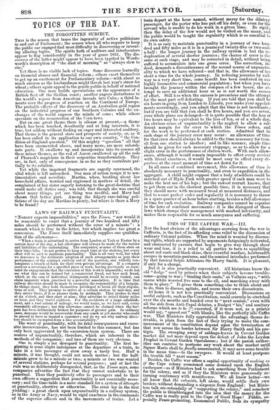TOPICS OF THE DAY.
THE FORGOMEN SUBJECT.
THIS is the season that taxes the ingenuity of active politicians in and out of Parliament ; the season when all who require to keep the public ear engaged find most difficulty in discovering or invent- ing alluring topics. The spirits both of auditors and interlocutors appear to lag considerably in the year of grace 1851. The dis- courses of the latter might appear to have been typified in Words- worth's description of "the dust of morning" as "always slow to rise."
Yet there is no visible lack of topics. Some discourse learnedly on financial abuses and financial reform ; others exert themselves to get up an excitement for Parliamentary reform—with about as much success as the husbandman might thresh last year's straw for wheat ; others again appeal to the gentle public in behalf of national education. One man builds speculations on the appearance of a British fleet off the Sicilian coast; another augurs disturbance to I the world's repose from American inroads into Cuba ; a third la- ments over the progress of reaction on the Continent of Europe. I The probable effects of the discovery of an Australian gold region on the industrial progress of our Southern Colonies and the ex- changes of the world engross the minds of some; while others speculate on the resurrection of the Corn-laws.
But on one great theme there is silence at present,—a theme which has been touched, desultorily and at long intervals, it is true, but seldom without finding an eager and interested auditory. , That theme is the general state and prospects of society, or, as it I has been called in its application to our own country, "the Con- I dition-of-England question." Of this mighty " question " all that have been enumerated above, and many more, are mere subordi- nate parts. It swallows up and incorporates into its essence all these minor themes, as the rod of A sron swallowed up all the rods of Pharaoh's magicians in their serpentine transformation. They are, in fact, only of consequence in so far as they contribute par- tia]ly to its solution.
Yet while the impotent fragments are eagerly canvassed, the vital whole is left untouched. Our men of action resign it to sen- timentalists and novelists. Martha, when, bustling about her household affairs, worried and engrossed in matters of detail, she oom lained of her sister eagerly listening to the great doctrine that coulti make all duties easy, was told, that though she was careful about many things, yet one thing was needful, and Mary had chosen that better part. Among the fidgety care-taking poli- ticians of the day are Marthas in plenty, but where is there a Mary to be found ?


























 Previous page
Previous page